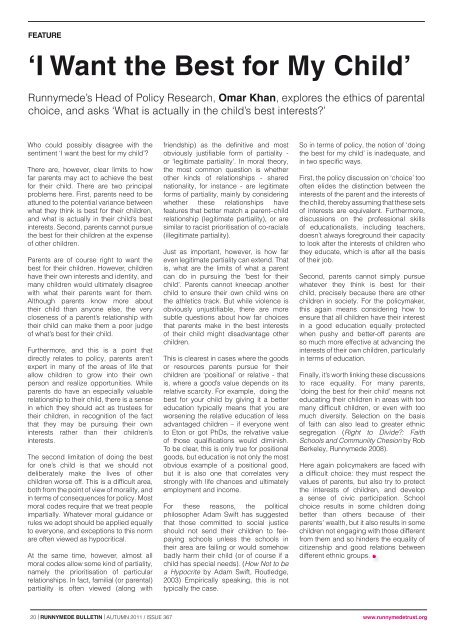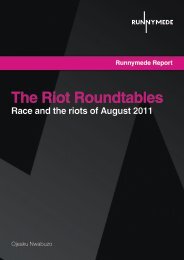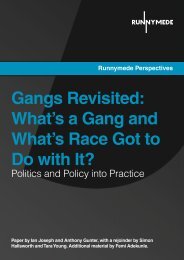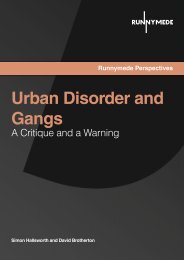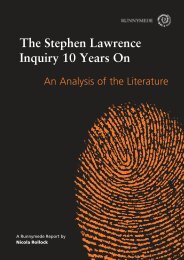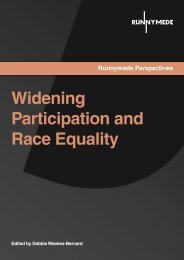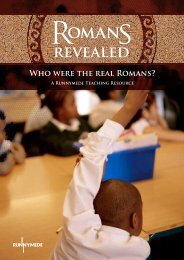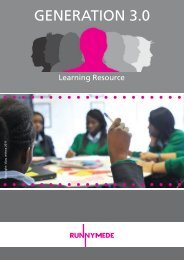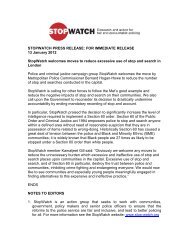PARENTINg - Runnymede Trust
PARENTINg - Runnymede Trust
PARENTINg - Runnymede Trust
You also want an ePaper? Increase the reach of your titles
YUMPU automatically turns print PDFs into web optimized ePapers that Google loves.
feature<br />
‘I Want the Best for My Child’<br />
<strong>Runnymede</strong>’s Head of Policy Research, Omar Khan, explores the ethics of parental<br />
choice, and asks ‘What is actually in the child’s best interests?’<br />
Who could possibly disagree with the<br />
sentiment ‘I want the best for my child’?<br />
There are, however, clear limits to how<br />
far parents may act to achieve the best<br />
for their child. There are two principal<br />
problems here. First, parents need to be<br />
attuned to the potential variance between<br />
what they think is best for their children,<br />
and what is actually in their child’s best<br />
interests. Second, parents cannot pursue<br />
the best for their children at the expense<br />
of other children.<br />
Parents are of course right to want the<br />
best for their children. However, children<br />
have their own interests and identity, and<br />
many children would ultimately disagree<br />
with what their parents want for them.<br />
Although parents know more about<br />
their child than anyone else, the very<br />
closeness of a parent’s relationship with<br />
their child can make them a poor judge<br />
of what’s best for their child.<br />
Furthermore, and this is a point that<br />
directly relates to policy, parents aren’t<br />
expert in many of the areas of life that<br />
allow children to grow into their own<br />
person and realize opportunities. While<br />
parents do have an especially valuable<br />
relationship to their child, there is a sense<br />
in which they should act as trustees for<br />
their children, in recognition of the fact<br />
that they may be pursuing their own<br />
interests rather than their children’s<br />
interests.<br />
The second limitation of doing the best<br />
for one’s child is that we should not<br />
deliberately make the lives of other<br />
children worse off. This is a difficult area,<br />
both from the point of view of morality, and<br />
in terms of consequences for policy. Most<br />
moral codes require that we treat people<br />
impartially. Whatever moral guidance or<br />
rules we adopt should be applied equally<br />
to everyone, and exceptions to this norm<br />
are often viewed as hypocritical.<br />
At the same time, however, almost all<br />
moral codes allow some kind of partiality,<br />
namely the prioritisation of particular<br />
relationships. In fact, familial (or parental)<br />
partiality is often viewed (along with<br />
friendship) as the definitive and most<br />
obviously justifiable form of partiality -<br />
or ‘legitimate partiality’. In moral theory,<br />
the most common question is whether<br />
other kinds of relationships - shared<br />
nationality, for instance - are legitimate<br />
forms of partiality, mainly by considering<br />
whether these relationships have<br />
features that better match a parent–child<br />
relationship (legitimate partiality), or are<br />
similar to racist prioritisation of co-racials<br />
(illegitimate partiality).<br />
Just as important, however, is how far<br />
even legitimate partiality can extend. That<br />
is, what are the limits of what a parent<br />
can do in pursuing the ‘best for their<br />
child’. Parents cannot kneecap another<br />
child to ensure their own child wins on<br />
the athletics track. But while violence is<br />
obviously unjustifiable, there are more<br />
subtle questions about how far choices<br />
that parents make in the best interests<br />
of their child might disadvantage other<br />
children.<br />
This is clearest in cases where the goods<br />
or resources parents pursue for their<br />
children are ‘positional’ or relative - that<br />
is, where a good’s value depends on its<br />
relative scarcity. For example, doing the<br />
best for your child by giving it a better<br />
education typically means that you are<br />
worsening the relative education of less<br />
advantaged children – if everyone went<br />
to Eton or got PhDs, the relvative value<br />
of those qualifications would diminish.<br />
To be clear, this is only true for positional<br />
goods, but education is not only the most<br />
obvious example of a positional good,<br />
but it is also one that correlates very<br />
strongly with life chances and ultimately<br />
employment and income.<br />
For these reasons, the political<br />
philosopher Adam Swift has suggested<br />
that those committed to social justice<br />
should not send their children to feepaying<br />
schools unless the schools in<br />
their area are failing or would somehow<br />
badly harm their child (or of course if a<br />
child has special needs). (How Not to be<br />
a Hypocrite by Adam Swift, Routledge,<br />
2003) Empirically speaking, this is not<br />
typically the case.<br />
So in terms of policy, the notion of ‘doing<br />
the best for my child’ is inadequate, and<br />
in two specific ways.<br />
First, the policy discussion on ‘choice’ too<br />
often elides the distinction between the<br />
interests of the parent and the interests of<br />
the child, thereby assuming that these sets<br />
of interests are equivalent. Furthermore,<br />
discussions on the professional skills<br />
of educationalists, including teachers,<br />
doesn’t always foreground their capacity<br />
to look after the interests of children who<br />
they educate, which is after all the basis<br />
of their job.<br />
Second, parents cannot simply pursue<br />
whatever they think is best for their<br />
child, precisely because there are other<br />
children in society. For the policymaker,<br />
this again means considering how to<br />
ensure that all children have their interest<br />
in a good education equally protected<br />
when pushy and better-off parents are<br />
so much more effective at advancing the<br />
interests of their own children, particularly<br />
in terms of education.<br />
Finally, it’s worth linking these discussions<br />
to race equality. For many parents,<br />
‘doing the best for their child’ means not<br />
educating their children in areas with too<br />
many difficult children, or even with too<br />
much diversity. Selection on the basis<br />
of faith can also lead to greater ethnic<br />
segregation (Right to Divide?: Faith<br />
Schools and Communiity Chesion by Rob<br />
Berkeley, <strong>Runnymede</strong> 2008).<br />
Here again policymakers are faced with<br />
a difficult choice: they must respect the<br />
values of parents, but also try to protect<br />
the interests of children, and develop<br />
a sense of civic participation. School<br />
choice results in some children doing<br />
better than others because of their<br />
parents’ wealth, but it also results in some<br />
children not engaging with those different<br />
from them and so hinders the equality of<br />
citizenship and good relations between<br />
different ethnic groups.<br />
20 | RUNNYMEDE BULLETIN | Autumn 2011 / issue 367 www.runnymedetrust.org


